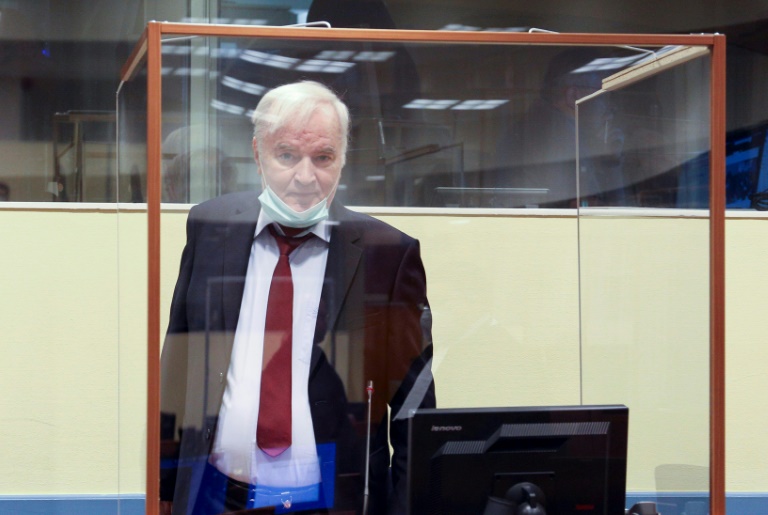Former Bosnian Serb military chief Ratko Mladic will on Tuesday hear the decision on his appeal against his genocide conviction, in a Hague tribunal’s final verdict on the 1995 Srebrenica massacre.
The ruling will be the closing chapter in the case against the man dubbed the “Butcher of the Balkans”, who was sentenced to life imprisonment by a UN war crimes tribunal in 2017.
Now an ailing 78-year-old, the once-burly military strongman of the 1992-1995 Bosnian war is expected to be in court, where he has previously delivered angry outbursts against the West.
Mothers of some of the 8,000 men and boys killed in the worst act of bloodshed on European soil since World War II will be outside the court where they have long campaigned for justice.
“We will go to The Hague to look the executioner in the eye once again as he is finally sentenced,” Munira Subasic, president of one of the “Mothers of Srebrenica” associations, told AFP.
The verdict will be handed down at 1300 GMT, viewable on a livestream with a half hour delay because the courtroom is closed to journalists due to coronavirus restrictions, at the International Residual Mechanism for Criminal Tribunals.
Its prosecutor Serge Brammertz said he was “cautiously optimistic” about the verdict, telling reporters this week he “can’t imagine another outcome than confirmation”.
The mechanism deals with cases left over from the now-closed UN war crimes court for the former Yugoslavia, which brought justice for crimes in the bloody break-up of the country in the 1990s.
– ‘Future of our children’ –
Mladic, who spent a decade on the run before his capture in 2011, was convicted of one count of genocide over Srebrenica as well as for war crimes and crimes against humanity in general during the Bosnian war.
Judges found him guilty of orchestrating a campaign of “ethnic cleansing” to drive Muslims and Bosnians out of key areas to create a Greater Serbia as Yugoslavia tore itself apart after the fall of communism.
The war left around 100,000 people dead and 2.2 million displaced.
Prosecutors said he personally oversaw the massacre at the supposedly UN-protected enclave of Srebrenica as part of a campaign of ethnic cleansing to drive out Muslims.
Footage from the time showed him handing out sweets to children before they and the women of Srebrenica were taken away by bus, while the men of the town were marched into a forest and executed.
Relatives of the victims also hoped that the court would also overturn Mladic’s acquittal in 2017 on wider genocide convictions, saying it was necessary for reconciliation between still-divided communities.
“This verdict is not only important for the victims and survivors.
It is very important for the future of our children, of all of us,” said Subasic, who planned to be at the court with around a dozen supporters.
– ‘Everyone is proud’ –
But for many Bosnian Serbs, Mladic and Karadzic remain heroes.
“Everyone is proud that he is from here,” said Radosav Zmukic, head of a local veterans’ group in Mladic’s hometown of Kalinovik.
He recalled meeting Mladic two or three times during the war and being impressed by his “boldness”.
During a long legal process delayed repeatedly after Mladic needed surgery to remove a polyp, and then because of the Covid-19 pandemic, Mladic appealed all the convictions and his life sentence.
The frail-looking former general raged during the two-day appeal hearing in August 2020 that he had been “pushed into war” and dismissed the court as a “child of western powers”.
He was the military face of a trio led on the political side by ex-Yugoslav president Slobodan Milosevic and former Bosnian Serb leader Radovan Karadzic.
Milosevic died of a heart attack in his cell in The Hague in 2006 before his trial had finished while Karadzic is serving a life sentence for genocide in Srebrenica.
Prosecutor Brammertz warned the Mladic judgment would not bring an end to the divisions in the Balkans, saying it was just “the end of one chapter”.
“Denial of genocide is the last phase of the genocide,” Brammertz said.
burs-dk/bp











